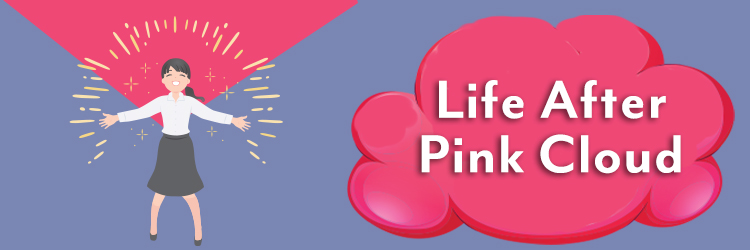“Pink cloud” refers to the euphoria some people feel in early sobriety or after detoxing from substances. It generally happens within the first few weeks—lasting no longer than a year—but that’s different for everyone. Some people never float on a pink cloud.
I did, but not until I was two and a half months sober. Those first months, my exhaustion and fogginess were so heavy I consulted a doctor. I imagine it took that long for my body to grow accustomed to life without substances. But once it did, the pink cloud hit hard. I was suddenly ecstatic. Everything felt like a revelation. For several months, I was on a natural high.
But even when I was still on a pink cloud, I dreaded when it would end. I dreaded when the sobriety milestones would get farther apart—when I wouldn’t notice changes from week to week. I was afraid for the reality of longer term sobriety to set in.
That’s a common worry. The fear is that newly sober people will think that’s how recovery always feels; the comedown will be devastating and put their sobriety at risk.
Since the pink cloud is not caused by drugs, the comedown from it is not as dramatic. At least it wasn’t in my experience. It was a gradual return to a new sober baseline. As I settled into this, I became excited about deeper growth.
Cyndi Turner, co-founder and Clinical Director of Insight Into Action Therapy, says people often relapse when the changes they notice in sobriety start slowing down. Now at five years sober and looking back, I see that I set myself up for success by expecting future growth, even when it was less immediate.
I knew I’d grow because when I was in early sobriety, I read and learned all I could about the stages of addiction and recovery. I still do. You can do this by reading books, finding online articles from reputable sources, listening to sobriety podcasts, or talking to people with more recovery time than you about their experiences. This can help demystify the process and get you excited.
Time almost always equals growth, but active addiction stunts growth. With more time sober, we can naturally expect continued change.
If you experience a crash after the pink cloud, try focusing on small, manageable goals. For instance, if you want to meditate daily, start off slow. Try it weekly or at another frequency that seems doable. Focus on smaller steps towards larger goals and pay attention if you feel overwhelmed. That might signal that you need to scale back.
Perhaps when you were in the pink cloud, you had big ideas about all the things you would accomplish—immediately. I know I did. But once the cloud lifts, having too many expectations of yourself can lead to burnout.
Later in recovery, you may not feel the same intense euphoria that you do during the pink cloud. Still, there will be plenty of highs in your sobriety. In long-term recovery, especially with the help of therapy, you can learn to reframe negative thought patterns. That way when you experience the highs, you will be able to recognize them.
Early sobriety is an exciting and sometimes scary time filled with lots of intense emotions. In that way, it can mirror active addiction—they both tend to be all-consuming and filled with extreme highs and lows.
When you settle into longer term sobriety, you learn to live a different kind of life, often without such dramatic extremes. This can feel unfamiliar. But long-term sobriety is a chance to go deeper and experience gradual—but even more profound—change.
If you are looking to change your life, there is help available. TruHealing Centers offers high-quality, individualized treatment for substance use and mental health disorders. At our facilities across the country, we will help you work through traumas and build coping skills. Our staff—many of whom are in recovery themselves—will help you do the deeper work so that you can thrive in long-term recovery. Call an admissions specialist at 410-593-0005.









